The Importance of Eating Healthy
Consuming too much of the wrong foods can lead to health risks such as heart disease and certain types of cancers (1). Practicing proper nutrition is the best way to live a healthy life and prevent chronic diseases. Eating healthy means making good choices on a daily basis. It is important to teach people of all ages how to eat healthy. Obesity caused by unhealthy eating habits is leading to a large population of youth plagued by high blood pressure and type 2 diabetes (1). Proper diet and moderate physical activity are important for children and adults.
Examples of Healthy Foods
Red, Orange, and Dark Green Vegetables
- tomatoes
- sweet potatoes
- broccoli
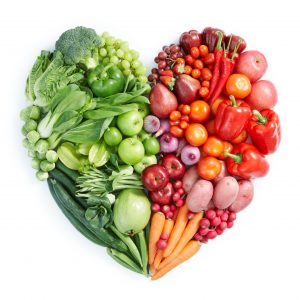
Whole Grains
- whole wheat
- brown rice
- wild rice
- quinoa
Lean Proteins
- turkey breast
- chicken breast
- seafood
- eggs
- nuts
- beans
- peas
Best Foods for the Immune System
It is important to eat a variety of fruits and vegetables for a healthy immune system. You also need a number of vitamins to maintain optimal immune function. Some of the best foods for immunity include large amounts of vitamin C, vitamin A, vitamin D, and vitamin E. Folate and iron are also very important nutrients (2).
Foods Containing Vitamin C
A healthy immune system comes from eating a lot of fruits and vegetables on a regular basis. Vitamin C is an important mineral for immune health and is very easy to obtain from your diet. Citrus fruits and leafy green vegetables are an excellent source of vitamin C (2).
Foods especially high in Vitamin C are:
- spinach
- kale
- bell peppers
- brussels sprouts
- strawberries
- papaya
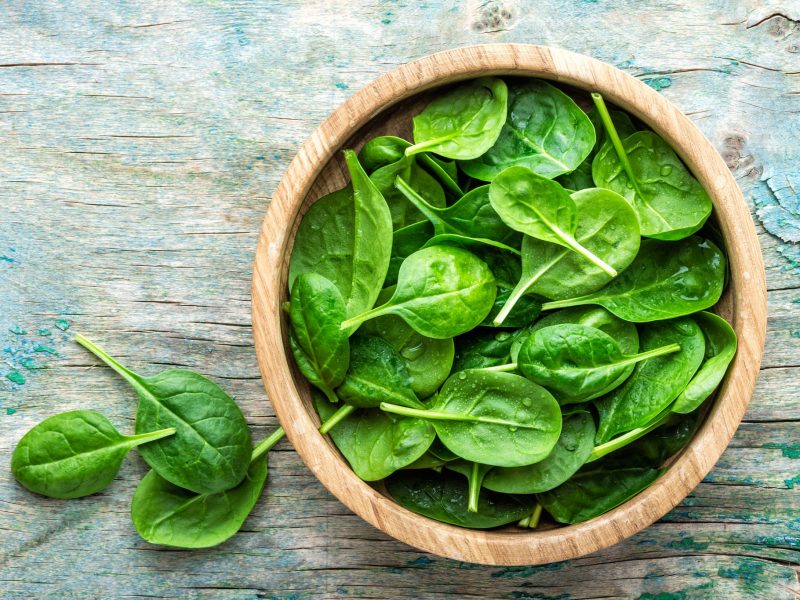
Foods Containing Vitamin A
By eating foods containing a lot of beta-carotene we can strengthen our immune system. This is because the body turns carotenoids into vitamin A, and produces infection-fighting results (2).
- carrots
- sweet potatoes
- pumpkin
- cantaloupe
- squash
Foods Containing Vitamin D
Sometimes it is hard to obtain a lot of vitamin D from diet alone. Supplements may be recommended by a doctor if needed (2). A lot of fortified foods contain vitamin d such as milk, orange juice, and cereal. A good way to increase intake of vitamin D is by consuming:
- salmon
- mackerel
- tuna
- sardines
Foods Containing Vitamin E
Vitamin E prevents oxidative stress on our body’s cells and helps strengthen our immune response (2). Good sources of vitamin E are:
- almonds
- peanuts
- hazelnuts
- sunflower seeds
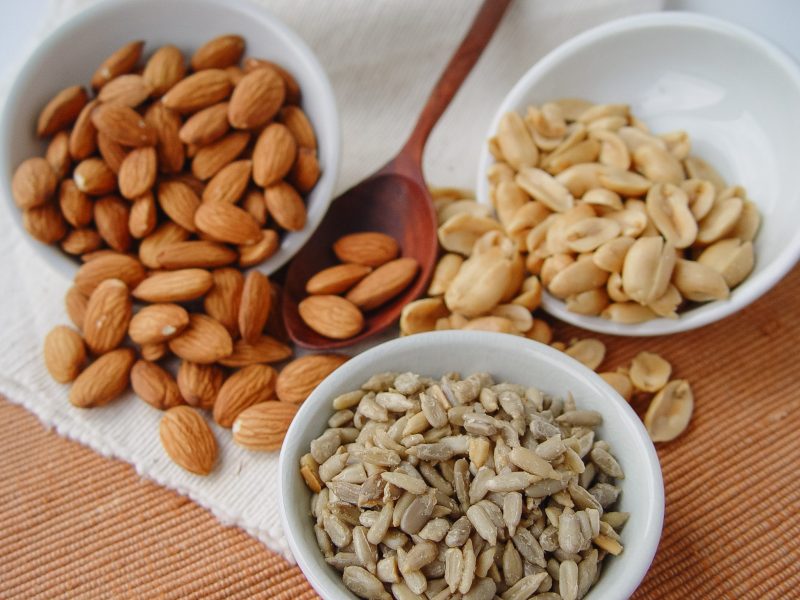
Foods containing Folate & Iron
Folate is a B vitamin that has a lot of health benefits. The synthetic form, called folic acid is added to a lot of foods due to the positive impacts it has on the body (2).
Foods containing folate are:
- beans
- peas
- leafy green vegetables
Folic acid is often found in:
- bread
- pasta
- rice
Iron is an important part of our diet as it helps carry oxygen to our cells (2). Foods high in iron include:
- chicken
- turkey
- seafood
- spinach
- kale
Best Foods for Digestion
Bacteria often gets a “bad rap.” However, the bacteria in our gut is essential for proper digestion. Some bacteria can cause infection, but others are important for fighting disease. A proper balance of good and bad bacteria is needed for healthy digestion (3). A great way to add healthy bacteria is through the consumption of probiotics. Probiotics include live and active bacterial cultures (3). While there are probiotic supplements, fermented foods are the best source of probiotics.
Some fermented foods include:
- yogurt
- Kefir
- kombucha
- sauerkraut
- kimchi
- miso
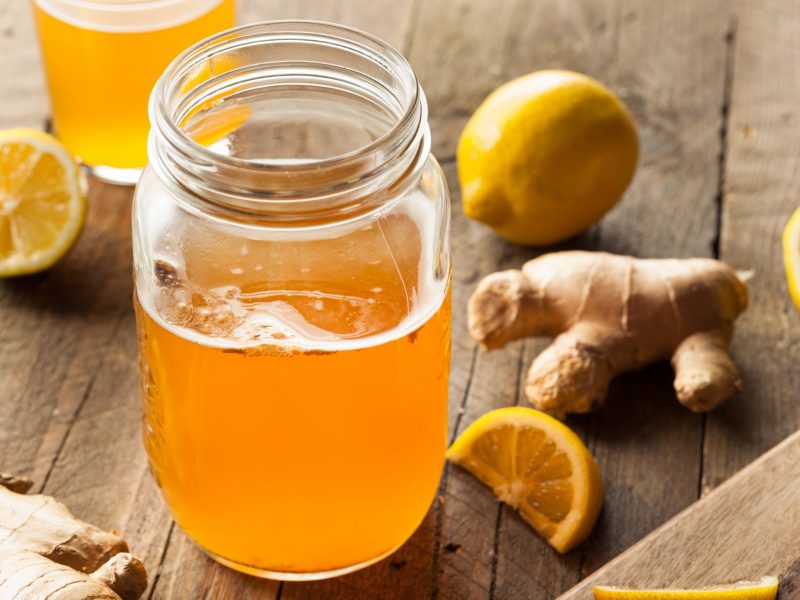
While whole grains are good for our body, we need soluble fiber to contribute to our digestive tract (4). Good sources of soluble fiber include:
- oats
- dried beans
- oranges
Best Foods for Brain Health
Like most things, brain health is supported by a well-balanced diet. However, some elements especially believed to support cognitive function are omega-3 fatty acids, B vitamins, and antioxidants (5).
Some of the best foods for brain health include:
Green Leafy Vegetables
- kale
- spinach
- collards
- broccoli
These foods contain vitamin K, lutein, folate, and beta-carotene which help to slow cognitive decline (5).
Fish
- salmon
- cod
- canned tuna
- pollack
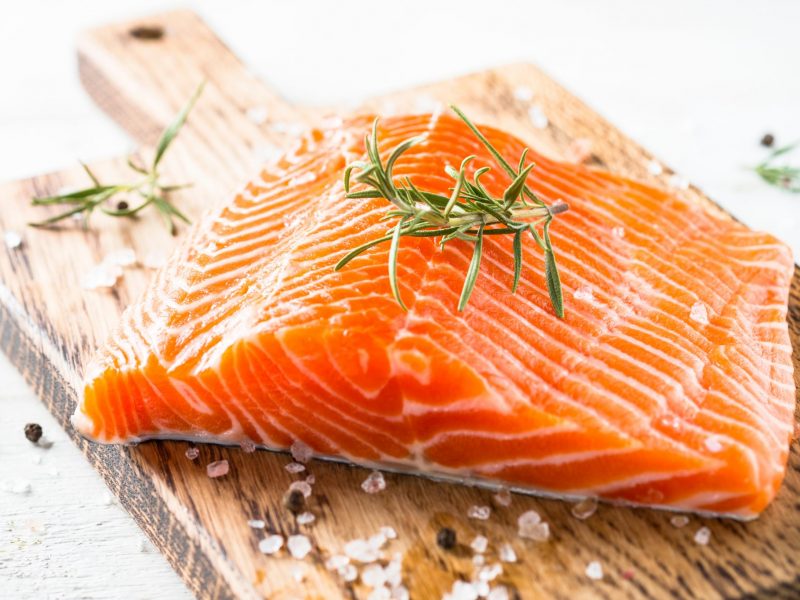
Fish contains a great amount of omega-3 fatty acids which are healthy fats that lower blood levels of beta-amyloid. Beta-amyloid is the protein that damages the brain of Alzheimer’s patients (5).
Sources of omega-3 fatty acids besides fish are:
- flaxseed
- avocados
- walnuts
Best Foods for Heart Health
Omega 3-fatty acids have numerous benefits for the heart just like the brain. Walnuts are a great source of omega-3 fatty acid because they contain a type of omega 3- called alpha-linolenic acid (ALA). ALA supports lower blood pressure, and in turn lower risk for heart attack (5).
As always a well-rounded diet of fish, vegetables, fruit, and whole grains is important for heart health (6). Some easy foods to incorporate into your diet for general heart health are:
- salmon
- mackerel
- trout
- black beans
- kidney beans
- blueberries
- cranberries
- strawberries
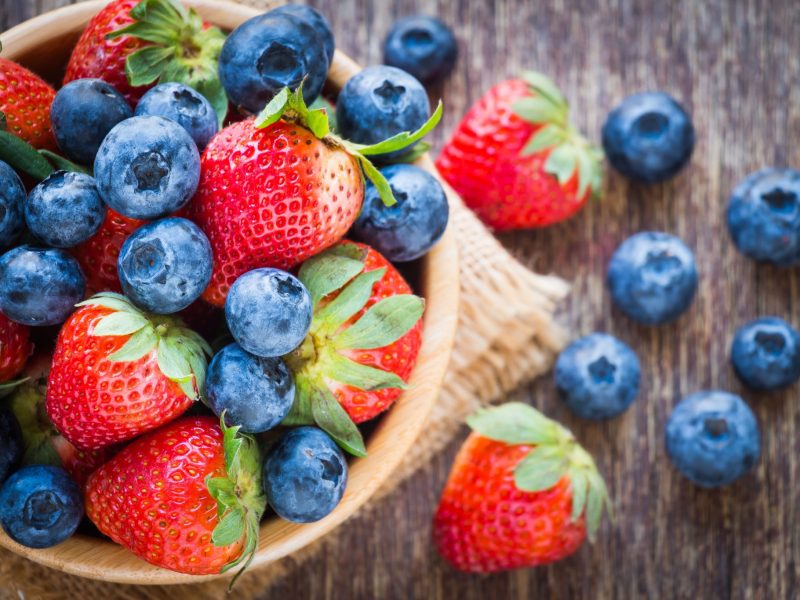
If fish is not an option for your diet, tofu in a stir-fry with vegetables is a heart-friendly meal (6).
In moderate amounts, red wine and dark chocolate can positively impact heart health (6). A 4-ounce glass of red wine can improve the HDL or “good” cholesterol levels of in our body. Women should limit their intake to one glass and men at two glasses (6). Dark chocolate that is 70 percent cocoa has also been shown to benefit the heart (6).
Best Foods for Skin Health
Omega-3s are vital for healthy looking skin as they reduce inflammation and preserve collagen (7). Fish is the best source of omega-3 fatty acids, but there are some plant sources:
- walnuts
- soy foods
- spinach
- wheat germ
- strawberries
- citrus fruits
- cantaloupe
- apricots
Additionally, to maintain vibrant skin it is important to limit junk food and foods with added sugar. Dark chocolate is another food that comes up once again with surprising health benefits, this time for the skin, as the flavanols it contains helps smooth skin and protect from the suns harmful rays. Just make sure to consume it in moderation and that it’s made up of at least 60-70% cocoa (7).
Best Foods for Weight Loss
Eating fewer calories of the healthiest foods available is the best way to lose weight. As a general rule of thumb, the healthiest foods are unrefined and minimally processed (9). Examples include fruits, vegetables, whole grains, healthy monounsaturated fats, and healthy sources of protein.
Foods commonly associated with weight loss are:
- fish
- chicken
- whole wheat
- beans
- nuts
- yogurt
There are a few tips and tricks for creating well-balanced meals.
- Include large side dishes of fruits and vegetables. Half of your plate should consist of fruits and/or vegetables (9).
- Whole grains should make up a fourth of your plate. Whole wheat, quinoa, brown rice, and oats all have a better impact on your blood sugar levels than refined grains (white bread) (9).
- Protein should also make up a fourth of your plate. Eat fish, chicken, beans, and nuts instead of processed meat (9).
- Healthy Plant Oils, like extra virgin olive oil, should be used instead of partially hydrogenated oils containing trans fat (9).
- Replace sugary beverages with water as an easy way to consume fewer calories (9).
Eating Healthy Decreases Disease Risk
By eating a healthy diet containing the proper balance of carbohydrates, fats, and amino acids we can better shield ourselves from disease. It is important to choose the right carbohydrates, such as fruits, as they contain many important vitamins and cancer-fighting agents. Healthy fats, such as fish and avocados, protect our heart and brain, by keeping LDL cholesterol levels low. Eating healthy proteins and limiting processed foods can also lower cholesterol levels, improve skin health, and help in weight loss.
Citations
- https://www.hhs.gov/fitness/eat-healthy/importance-of-good-nutrition/index.html
- https://health.clevelandclinic.org/eat-these-foods-to-boost-your-immune-system/
- https://health.clevelandclinic.org/how-to-pick-the-best-probiotic-for-you/
- https://health.clevelandclinic.org/5-reasons-you-should-add-more-fermented-foods-to-your-diet-infographic/
- https://www.health.harvard.edu/mind-and-mood/foods-linked-to-better-brainpower
- https://health.clevelandclinic.org/15-heart-healthy-foods-to-work-into-your-diet/
- https://health.clevelandclinic.org/23-foods-good-skin/
- https://www.hsph.harvard.edu/nutritionsource/healthy-weight/best-diet-quality-counts/
- https://www.hsph.harvard.edu/nutritionsource/healthy-eating-plate/


 The Role of Diet in Cancer Prevention and Development
The Role of Diet in Cancer Prevention and Development